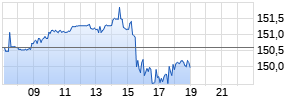
AbbVie Announces European Commission Approval of AQUIPTA® (atogepant) for the Preventive Treatment of Migraine in Adults
PR Newswire
NORTH CHICAGO, Ill., Aug. 17, 2023
- AQUIPTA® (atogepant) is the first and only once-daily oral calcitonin gene-related peptide (CGRP) receptor antagonist (gepant) in the European Union (EU) approved for the prophylaxis of migraine in adults who have four or more migraine days per month
- Approval is based on two pivotal Phase 3 studies that demonstrated statistically significant reduction in mean monthly migraine days with AQUIPTA compared to placebo in adult patients with both chronic and episodic migraine
- The approval expands AbbVie's portfolio of therapies for adult patients in the EU across migraine frequencies, including episodic and chronic migraine
NORTH CHICAGO, Ill., Aug. 17, 2023 /PRNewswire/ -- AbbVie (NYSE: ABBV) today announced that the European Commission has approved AQUIPTA® (atogepant) for the prophylaxis of migraine in adults who have four or more migraine days per month. The approval makes AQUIPTA the first and only once-daily oral calcitonin gene-related peptide (CGRP) receptor antagonist (gepant) treatment in the European Union for the preventive treatment of both chronic and episodic migraine.
Chronic migraine is characterized by 15 or more headache days per month and at least eight migraine days, while episodic migraine refers to people with migraine who have less than 15 headache days per month.1 People living with migraine may experience frequent disabling attacks that prevent them from performing daily activities and can significantly affect their quality of life.2 This debilitating disease also imposes both a social and financial burden for people living with migraine and health care systems.3 In Europe, migraine is estimated to cost the economy €50 billion annually due to reduced productivity and workdays lost.4
"The European Commission approval of AQUIPTA is a significant milestone for people suffering from four or more migraine days per month as it provides a once-daily treatment option that can reduce the number of migraine days and the associated pain they experience," said Roopal Thakkar, SVP, Development and Regulatory Affairs, Chief Medical Officer, AbbVie. "With this approval, AbbVie can help meet additional migraine patient needs through our enhanced portfolio of treatment options across migraine frequencies, including episodic and chronic migraine."
The approval of AQUIPTA is supported by data from two pivotal Phase 3 studies, PROGRESS and ADVANCE, which evaluated 60 mg once-daily (QD) AQUIPTA in adult patients with chronic migraine and episodic migraine, respectively. Both studies met their primary endpoint of a statistically significant reduction in mean monthly migraine days (MMDs), compared to placebo across the 12-week treatment period. Additionally, statistically significant improvements were seen in all secondary endpoints with AQUIPTA 60 mg QD, with a key secondary endpoint measuring the proportion of patients that achieved at least a 50% reduction in MMDs across the 12-week treatment period.5,6
In the PROGRESS study, the changes from baseline in MMDs was a reduction of 6.8 days for AQUIPTA 60 mg QD and a reduction of 5.1 days for placebo (p=0.0024). The study demonstrated that 40% of patients treated with AQUIPTA 60 mg QD achieved at least a 50% reduction in MMDs, compared to 27% of patients in the placebo arm (p=0.0024).5 In the ADVANCE study, the changes from baseline in MMDs was a reduction of 4.1 days for AQUIPTA 60 mg QD and a reduction of 2.5 days for placebo (p≤0.001). The study also demonstrated that 59% of patients treated with AQUIPTA 60 mg QD achieved at least a 50% reduction in MMDs, compared to 29% of patients in the placebo arm (p≤0.0001).6
In both studies, AQUIPTA 60 mg QD was well tolerated and the most common adverse events were constipation (8%), nausea (9%) and fatigue (5%). The adverse drug reaction most commonly leading to study discontinuation was nausea (0.4%).5,6
"Migraine is a neurological disease that causes recurrent pain and other migraine-associated symptoms, with attacks that can last several hours to days, leading to missed life opportunities," said Prof. Patricia Pozo-Rosich, MD, PhD, Head of Neurology Section, Vall d'Hebron Hospital and Institute of Research, Spain. "The pivotal Phase 3 studies demonstrated AQUIPTA provides significant and sustained reduction of mean monthly migraine days. This allows people to experience relief with a simple to take once-daily tablet, including those who have had an insufficient response to prior preventative migraine treatments."
Atogepant is approved in the United States for both chronic and episodic migraine and in Canada for episodic migraine under the brand name QULIPTA®.
About the Phase 3 PROGRESS Clinical Trial5
The pivotal Phase 3 PROGRESS study evaluated the safety, tolerability, and efficacy of oral atogepant for the prophylaxis of chronic migraine compared with placebo. The study included 778 patients with a diagnosis of chronic migraine for at least one year, with greater or equal to 15 headache days and at least eight migraine days in the 28 days prior. Patients were randomized into one of three treatment groups receiving 60 mg QD of atogepant, 30 mg twice daily of atogepant, or placebo. The primary endpoint measured the reduction from baseline in mean MMDs compared to placebo for 60 mg QD across a 12-week treatment period (p=0.0024). The overall safety profile observed in the Phase 3 PROGRESS study was consistent with safety findings observed in previous studies. The most common adverse events reported with a frequency greater than or equal to 5% in the atogepant 60 mg QD arm were constipation (10% vs. 3% for placebo), nausea (10% vs. 4% for placebo), abdominal pain (10% vs. 1% for placebo), diarrhea (10% vs. 2% for placebo), and insomnia (10% vs. 2% for placebo). Most of the events of constipation and nausea were mild or moderate in severity and did not lead to study discontinuation.
Additional key secondary endpoints included change from baseline in mean monthly headache days (MHDs), change from baseline in mean monthly acute-medication use days, proportion of participants with at least a 50% reduction in MMDs across the 12-week treatment period, and several patient-reported outcome measures assessing functioning.
About the Phase 3 ADVANCE Clinical Trial6
The pivotal Phase 3 ADVANCE study evaluated the efficacy, safety, and tolerability of oral atogepant for the prevention of migraine in those with 4 to 14 migraine days per month. A total of 910 patients were randomized to one of four treatment groups evaluating 10 mg, 30 mg, or 60 mg of atogepant QD, or placebo. The primary endpoint was change from baseline in mean MMDs compared to placebo for 60 mg QD across a 12-week treatment period (p<0.001). The study demonstrated that treatment with atogepant 60 mg QD resulted in statistically significant improvements in all the primary and secondary endpoints. The most common adverse events reported with a frequency greater than or equal to 5% in the atogepant 60 mg QD arm were constipation (6.9% vs. 0.5% for placebo) and nausea (6.1% vs. 1.8% for placebo). Most of the events of constipation and nausea were mild or moderate in severity and did not lead to study discontinuation.
Additional key secondary endpoints included change from baseline in MHDs, mean monthly acute-medication use days, proportion of patients achieving at least a 50% reduction from baseline in MMDs across the 12-week treatment period, and several patient-reported outcome measures assessing functioning.
About AQUIPTA® (atogepant)
Atogepant is an orally administered, CGRP receptor antagonist specifically developed for the preventive treatment of migraine in adults who have four or more migraine days per month. CGRP and its receptors are expressed in regions of the nervous system associated with migraine pathophysiology. Studies have shown that CGRP levels are elevated during migraine attacks and selective CGRP receptor antagonists confer clinical benefit in migraine.
EU Indications and Important Safety Information about AQUIPTA®▼(atogepant)
Indication
AQUIPTA (atogepant) is indicated for prophylaxis of migraine in adults who have at least 4 migraine days per month.
Important Safety Information
Contraindications
AQUIPTA is contraindicated in patients with hypersensitivity to the active substance or to any of the excipients.
Special warnings and precautions for use
AQUIPTA is not recommended in patients with severe hepatic impairment.
Fertility, pregnancy and lactation
AQUIPTA is not recommended during pregnancy and in women of childbearing potential not using contraception.
Effects on ability to drive and use machines
AQUIPTA has no or negligible influence on the ability to drive and use machines. However, it may cause somnolence in some patients. Patients should exercise caution before driving or using machinery until they are reasonably certain that AQUIPTA does not adversely affect performance.
Adverse reactions
The most commonly reported adverse drug reactions during AQUIPTA studies were nausea 9%, constipation 8%, and fatigue/somnolence 5%. Most of the reactions were mild or moderate in severity. The adverse drug reaction that most commonly led to discontinuation was nausea 0.4%.
This is not a complete summary of all safety information. See AQUIPTA full summary of product characteristics (SmPC) at www.ema.europa.eu.
Globally, prescribing information varies; refer to the individual country product label for complete information.
About AbbVie in Neuroscience
At AbbVie, our commitment to preserving personhood of people around the world living with neurological and psychiatric disorders is unwavering. With more than three decades of experience in neuroscience, we are providing meaningful treatment options today and advancing innovation for the future. AbbVie's Neuroscience portfolio consists of approved treatments in neurological conditions, including migraine, movement disorders, and psychiatric disorders, along with a robust pipeline of transformative therapies. We have made a strong investment in research and are committed to building a deeper understanding of neurological and psychiatric disorders. Every challenge makes us more determined and drives us to discover and deliver advancements for those impacted by these conditions, their care partners, and clinicians. For more information, visit www.abbvie.com.
About AbbVie
AbbVie's mission is to discover and deliver innovative medicines and solutions that solve serious health issues today and address the medical challenges of tomorrow. We strive to have a remarkable impact on people's lives across several key therapeutic areas – immunology, oncology, neuroscience, and eye care – and products and services in our Allergan Aesthetics portfolio. For more information about AbbVie, please visit us at www.abbvie.com. Follow @abbvie on Twitter, Facebook, Instagram, YouTube and LinkedIn.
Forward-Looking Statements
Some statements in this news release are, or may be considered, forward-looking statements for purposes of the Private Securities Litigation Reform Act of 1995. The words "believe," "expect," "anticipate," "project" and similar expressions and uses of future or conditional verbs, generally identify forward-looking statements. AbbVie cautions that these forward-looking statements are subject to risks and uncertainties that may cause actual results to differ materially from those expressed or implied in the forward-looking statements. Such risks and uncertainties include, but are not limited to, challenges to intellectual property, competition from other products, difficulties inherent in the research and development process, adverse litigation or government action, and changes to laws and regulations applicable to our industry. Additional information about the economic, competitive, governmental, technological and other factors that may affect AbbVie's operations is set forth in Item 1A, "Risk Factors," of AbbVie's 2022 Annual Report on Form 10-K, which has been filed with the Securities and Exchange Commission, as updated by its subsequent Quarterly Reports on Form 10-Q. AbbVie undertakes no obligation, and specifically declines, to release publicly any revisions to forward-looking statements as a result of subsequent events or developments, except as required by law.
References
1 Katsarava Z, Buse DC, Manack AN, Lipton RB. Defining the differences between episodic migraine and chronic migraine. Curr Pain Headache Rep. 2012; 16(1): 86–92.
2 Lantéri-Minet M, Duru G, Mudge M, Cottrell S. Quality of life impairment, disability and economic burden associated with chronic daily headache, focusing on chronic migraine with or without medication overuse: a systematic review. Cephalalgia. 2011;31:837-850.
3 Messali A, Sanderson JC, Blumenfeld AM, et al. Direct and indirect costs of chronic and episodic migraine in the United States: a web-based survey. Headache. 2016;56:306-322.
4 Rethinking Migraine in times of COVID-19. European Brain Council. 2023. Available at: https://www.braincouncil.eu/projects/rethinking-migraine/. Accessed August 11, 2023.
5 Pozo-Rosich P., et al. The Lancet. Atogepant for the Preventive Treatment of Chronic Migraine (PROGRESS). 2023; DOI: 10.1016/S0140-6736(23)01049-8.
6 Ailani J, et al. NEJM. Atogepant for the Preventive Treatment of Migraine. 2021; 385:695-706. DOI: 10.1056/NEJMoa2035908.
![]() View original content:https://www.prnewswire.com/news-releases/abbvie-announces-european-commission-approval-of-aquipta-atogepant-for-the-preventive-treatment-of-migraine-in-adults-301903027.html
View original content:https://www.prnewswire.com/news-releases/abbvie-announces-european-commission-approval-of-aquipta-atogepant-for-the-preventive-treatment-of-migraine-in-adults-301903027.html
SOURCE AbbVie

Mehr Nachrichten zur AbbVie Inc. Aktie kostenlos abonnieren
(Mit der Bestellung akzeptierst du die Datenschutzhinweise)

Hinweis: ARIVA.DE veröffentlicht in dieser Rubrik Analysen, Kolumnen und Nachrichten aus verschiedenen Quellen. Die ARIVA.DE AG ist nicht verantwortlich für Inhalte, die erkennbar von Dritten in den „News“-Bereich dieser Webseite eingestellt worden sind, und macht sich diese nicht zu Eigen. Diese Inhalte sind insbesondere durch eine entsprechende „von“-Kennzeichnung unterhalb der Artikelüberschrift und/oder durch den Link „Um den vollständigen Artikel zu lesen, klicken Sie bitte hier.“ erkennbar; verantwortlich für diese Inhalte ist allein der genannte Dritte.



